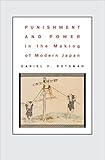Punishment and Power in the Making of Modern Japan / Daniel V. Botsman.
Material type: TextPublisher: Princeton, NJ : Princeton University Press, [2013]Copyright date: ©2004Edition: Course BookDescription: 1 online resource (312 p.) : 17 halftones. 1 line illus. 2 mapsContent type:
TextPublisher: Princeton, NJ : Princeton University Press, [2013]Copyright date: ©2004Edition: Course BookDescription: 1 online resource (312 p.) : 17 halftones. 1 line illus. 2 mapsContent type: - 9780691130309
- 9781400849291
- 364.6095209034
- HV9812 .B68 2013
- online - DeGruyter
- Issued also in print.
| Item type | Current library | Call number | URL | Status | Notes | Barcode | |
|---|---|---|---|---|---|---|---|
 eBook
eBook
|
Biblioteca "Angelicum" Pont. Univ. S.Tommaso d'Aquino Nuvola online | online - DeGruyter (Browse shelf(Opens below)) | Online access | Not for loan (Accesso limitato) | Accesso per gli utenti autorizzati / Access for authorized users | (dgr)9781400849291 |
Browsing Biblioteca "Angelicum" Pont. Univ. S.Tommaso d'Aquino shelves, Shelving location: Nuvola online Close shelf browser (Hides shelf browser)

|

|

|

|

|

|

|
||
| online - DeGruyter Baseball in Blue and Gray : The National Pastime during the Civil War / | online - DeGruyter Mothers and Children : Jewish Family Life in Medieval Europe / | online - DeGruyter Labor Rights Are Civil Rights : Mexican American Workers in Twentieth-Century America / | online - DeGruyter Punishment and Power in the Making of Modern Japan / | online - DeGruyter Morning in America : How Ronald Reagan Invented the 1980's / | online - DeGruyter Fossil Legends of the First Americans / | online - DeGruyter The Handless Maiden : Moriscos and the Politics of Religion in Early Modern Spain / |
Frontmatter -- Contents -- Illustrations -- Acknowledgments -- Abbreviations -- Introduction -- CHAPTER 1. Signs of Order: Punishment and Power in the Shogun's Capital -- CHAPTER 2. Bloody Benevolence: Punishment, Ideology, and Outcasts -- CHAPTER 3. The Power of Status: Kodenmachō Jailhouse and the Structures of Tokugawa Society -- CHAPTER 4. Discourse, Dynamism, and Disorder: The Historical Significance of the Edo Stockade for Laborers -- CHAPTER 5. Punishment and the Politics of Civilization in Bakumatsu Japan -- CHAPTER 6. Restoration and Reform: The Birth of the Prison in Japan -- CHAPTER 7. Punishment and Prisons in the Era of Enlightenment -- Conclusion -- Notes -- Bibliography -- Index
restricted access online access with authorization star
http://purl.org/coar/access_right/c_16ec
The kinds of punishment used in a society have long been considered an important criterion in judging whether a society is civilized or barbaric, advanced or backward, modern or premodern. Focusing on Japan, and the dramatic revolution in punishments that occurred after the Meiji Restoration, Daniel Botsman asks how such distinctions have affected our understanding of the past and contributed, in turn, to the proliferation of new kinds of barbarity in the modern world. While there is no denying the ferocity of many of the penal practices in use during the Tokugawa period (1600-1868), this book begins by showing that these formed part of a sophisticated system of order that did have its limits. Botsman then demonstrates that although significant innovations occurred later in the period, they did not fit smoothly into the "modernization" process. Instead, he argues, the Western powers forced a break with the past by using the specter of Oriental barbarism to justify their own aggressive expansion into East Asia. The ensuing changes were not simply imposed from outside, however. The Meiji regime soon realized that the modern prison could serve not only as a symbol of Japan's international progress but also as a powerful domestic tool. The first English-language study of the history of punishment in Japan, the book concludes by examining how modern ideas about progress and civilization shaped penal practices in Japan's own colonial empire.
Issued also in print.
Mode of access: Internet via World Wide Web.
In English.
Description based on online resource; title from PDF title page (publisher's Web site, viewed 29. Jul 2021)


